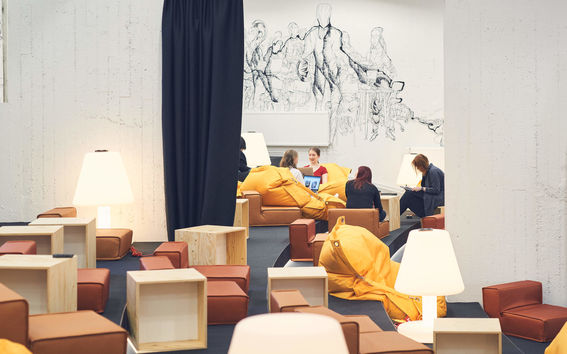Research project CreaTures seeks to further the sustainability agenda with creativity

New EU Horizon 2020 funded research project ‘CreaTures: Creative Practices for Transformational Futures’ starts in the beginning of 2020. The transdisciplinary project highlights how the arts can contribute to addressing climate change and associated effects. The project aims at demonstrating effective paths to achieving sustainability, social cohesion and peaceful co-existence at a time of rapid change. This will be achieved by identifying existing, often hidden transformational creative practices, by supporting new experimentation and direct audience engagement around these practices, and by evaluating their impact.
Creative practices are underused in the urgent task of changing cultures towards sustainability. CreaTures identifies those aspects of creative practice that contribute most effectively to socio-cultural transformation and that support practitioners and policy-makers in driving positive change.
The project draws on pilot research that shows how collaboration, reflection and direct engagement are key to changing the public’s orientation to environment issues. It identifies and evaluates the design of significant aspects, as well as the impact of different contexts, through three interrelated components:
- An Observatory: identifying and mapping existing, fragmented and often hidden transformational creative practices
- A Laboratory: supporting new experimentation and direct engagement with diverse stakeholders — including the members of the public — by mounting several different scales and types of arts production
- An Evaluation phase: testing new and existing creative practices in a systematic and concerted way for their impact.
The project will combine insights from these undertakings into a transdisciplinary, evidence-based, and practical framework that highlights the strengths of and opportunities for the arts to contribute to addressing climate change and associated effects. The resulting framework will demonstrate effective paths to achieving sustainability, social cohesion and peaceful co-existence at a time of rapid change. Offering a strategic research agenda for key stakeholders, a set of innovations addressing the cultures and conditions for delivering greater sustainability, and policy recommendations to focus and optimise work in mobilizing the arts for transformational futures.
The three year research project is coordinated by Aalto University Department of Design and the scientific coordinator of the project is professor Tuuli Mattelmäki. Other Aalto key personnel in the project include research fellow Andrea Botero, professor of artistic practice Julia Lohmann, professor Sampsa Hyysalo, and
project manager Riikka Raitio from the Aalto Research and Innovation Services. The total funding for the project is €3 million, out of which the funding for Aalto is €600 000.
Partners
There are 11 partners from five European member states in the project, bringing together several universities associated with creative approaches to transformation and sustainability. Aalto University School of Arts, Design and Architecture (FI) is a frontrunner when it comes to artistic and practice-based research, and has a strong expertise in collaborative and co-creation projects. The European branch of Royal Melbourne Institute of Technology (SP) brings considerable expertise on urban transformations. The University of Sussex’ (UK) Sustainability Research Programme is designed to bring together expert interdisciplinary teams to tackle complex sustainability issues and the pilot work behind this proposal was undertaken there. Utrecht University (NL) brings expertise on governance processes, pathways to sustainability and the use of simulation games. Alongside this research expertise in creative approaches to sustainability, the project will work in five main sites [Barcelona, Helsinki, Ljubljana, London, and Seville] through the work of skilled artistic practice led by major arts organisations: Superflux (UK) and Hellon (FI) are design studios doing consulting and commissioning work for private and public organizations. Furtherfield (UK) and Kersnikova (SL) are arts practices that also act as cultural institutions and producers, reaching a wider network of artists located throughout Europe, while ZEMOS98 (SP) is a creative practice organized as a cooperative with extensive networks in activist circles and grassroot projects across Europe.
This is complemented by two non-for-profit organizations with special domain knowledge: Sniffer (UK) brings expertise in brokering between creative practitioners and policy makers/implementers and evaluating change processes, and Open Knowledge Finland (FI) focusing on the application and development of open knowledge and systems thinking.
Together and separately, all consortium members have been working across the inter- related domains of care, ecological and social sustainability particularly in urban contexts, and using creative, participatory methods for transformation at scale, ranging from interaction to strategic design. This provides the momentum for CreaTures.
For more information, please contact:
Tuuli Mattelmäki, tuuli.mattelmaki@aalto.fi
Read more news

Renate Zhang’s journey in optimising the cost of creation
During the research program at Aalto University, Renate Zhang developed a cost-saving method that inspired her to pursue a doctoral degree.
Chinonyelum Igwe’s contribution to the frontier of medical AI
Chinonyelum Igwe pursued her dual passions for medicine and AI through the AScI International Summer Research Programme
Aalto University is introducing ORCID’s Researcher Connect service
Aalto University is introducing ORCID's Researcher Connect service, which facilitates information transfer between researchers' ORCID profiles and the university's research information management system, ACRIS.






